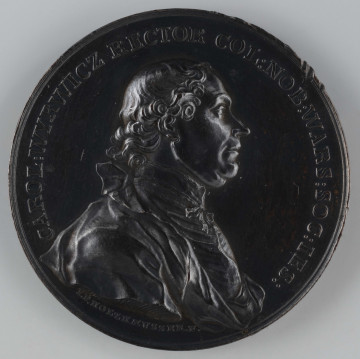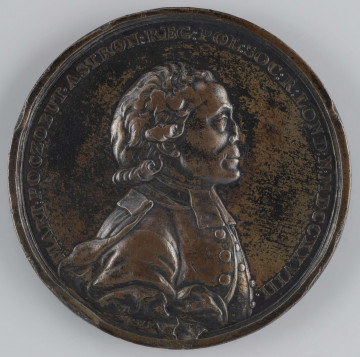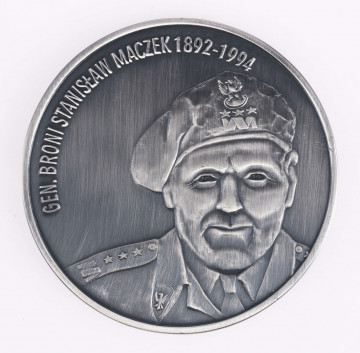
Karol Wyrwicz
1772
National Museum in Lublin
Part of the collection: Polish medallic art from the 16th to the 17th c.
The Jesuit priest Michał Ossowski (1743-1797) after the dissolution of the Society of Jesus by Pope Clement XIV in 1773 was associated with the Potocki family. In 1774 he became the teacher of Antoni Protazy Potocki (1761-1801), and soon his advisor, inspirer and collaborator in banking and commercial activities. The former Jesuit supported Potocki in establishing banking institutions in Warsaw, Machnówka in Ukraine and in the Russian city of Kherson, as well as in launching numerous manufactories on the magnate's estates. Michał Ossowski also contributed to Potocki's initiative of establishing the Black Sea Company in 1783, set up to redirect Polish trade to the Black Sea region. Its activities were interrupted by the outbreak of the Russian-Turkish War in 1787.
In July 1790, Michał Ossowski became a member of a team working on the preparation of the “Project for Domestic Economy”, and after the adoption of the Constitution of 3 May 1791 he was entrusted with the elaboration of a bill that would create conditions for the economic development of the country. These plans were thwarted by the partitions.
In recognition of Michał Ossowski's merits in the field of banking, industry and, above all, the development of Black Sea trade, in 1787 King Stanisław August Poniatowski (1764-1795) commissioned the court medallist Jan Filip Holzhaeusser (1741-1792) to create a medal in honour of the economist. Its obverse is decorated with the bust of Michał Ossowski in the right profile with a surrounding Latin inscription, translated as: “Michał Ossowski born in the year 1743”. The reverse side of the medal includes a ten-line horizontal Latin inscription: “CIVI UTILI QUI ZELO BONI PUBLICI DUCTUS NOVAS COMMERCII PATRII VIAS DIDICIT ET DOCUIT STAN[islaus] AUG[ustus] REX SUO ET GRATAE PATRIAE NOMINE A.[nno] MDCCLXXXVII”, translated as: “To the useful citizen, who, driven by the zeal for public good, invented new ways of trade for his homeland, king Stanisław August, in his own name and that of a grateful homeland in the year 1787”. The inscription is surrounded at the bottom by oak branches, symbolizing the strength of civic virtues, fastened with a caduceus - an attribute of Hermes, the patron of trade. The author of the medal is indicated by the signature on the obverse - I. P. H. F.
Silver and bronze prints of this work are known. Our copy was purchased for the Museum's collection in 1965 from the collection of Bolesław Minko.
Tomasz Markiewicz
Author / creator
Dimensions
cały obiekt: width: 44 mm
Object type
medal
Technique
stamp minting
Material
copper
Creation time / dating
Creation / finding place
Owner
The National Museum in Lublin
Identification number
Location / status

1772
National Museum in Lublin

1775
National Museum in Lublin

2004
National Museum in Lublin
DISCOVER this TOPIC
Museum of King Jan III's Palace at Wilanów
DISCOVER this PATH
Educational path